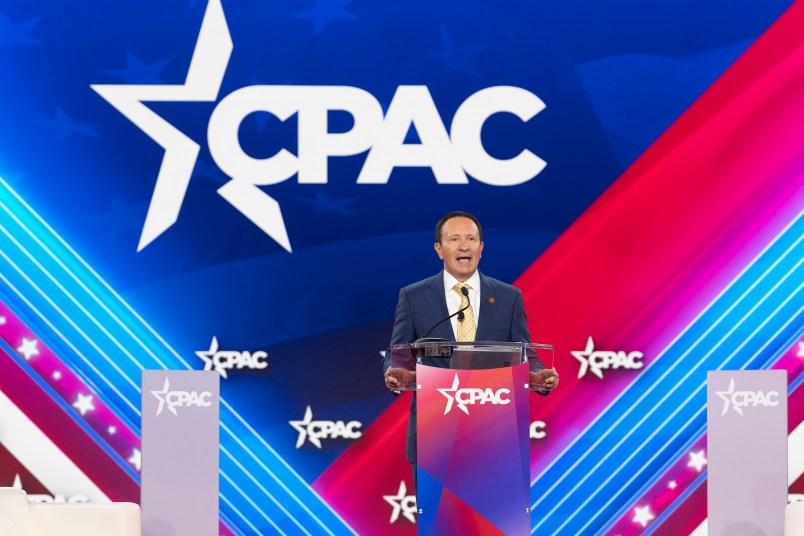Republican state officials and legislators in Louisiana argued to the Fifth Circuit Court of Appeals on Tuesday that the state has moved past racial discrimination in voting — and so should be allowed to suppress Black voting power with impunity.
In the newest attack on the hollowed-out Voting Rights Act, red states and right-wing lawyers are trying to stretch the Supreme Court’s disastrous decision in Shelby County v. Holder to other parts of the law. In that 2013 decision, the conservative justices ruled that because racism isn’t so bad anymore, states with histories of egregious voter discrimination should be free to continue the practice without having to first get permission, or preclearance, from the federal government. The ruling ushered in a flood of red-state voter restrictions and prompted then-Justice Ruth Bader Ginsberg’s famous line in dissent: “Throwing out preclearance when it has worked and is continuing to work to stop discriminatory changes is like throwing away your umbrella in a rainstorm because you are not getting wet.”
The new argument is part of a challenge to Louisiana’s state level legislative maps by a few voters represented by civil rights organizations, who argue that Black voters should make up a voting majority in several more state House and Senate districts.
Attorneys for the Louisiana officials and legislators told the federal appeals court that racism has waned, and with it the power of the 15th Amendment, which gives Congress the right to pass laws that protect the enfranchisement of people of color.
“It is clear that vote dilution claims in Louisiana are no longer justified by current conditions and so are no longer constitutional,” said Louisiana Assistant Solicitor General Morgan Brungard, using data the U.S. Justice Department called “gerrymandered statistics.”
Louisiana, and many other right-wing litigants, are clinging to a line from Justice Brett Kavanaugh in his concurrence in a major 2023 voting rights case, where the Supreme Court delivered a surprise ruling upholding the VRA.
“Even if Congress in 1982 could constitutionally authorize race-based redistricting under Section 2 for some period of time, the authority to conduct race-based redistricting cannot extend indefinitely into the future,” he wrote then.
Louisiana pointed to the line as evidence that the future has come, and Section 2, the part of the law under which illegal gerrymandering cases are brought, is no longer required or constitutional.
“They’re relying on basically two sentences of Justice Kavanaugh’s concurring opinion in Milligan — Justice Kavanaugh, of course, joined the section of the opinion that upheld Section 2’s constitutionality,” DOJ’s Noah Bokat-Lindell shrugged in response Tuesday.
He added that subjecting laws to continuous updating at the risk of forced sunsetting would likely infringe on the separation of powers, and hand Congress an impossible burden given the “thousands of local jurisdictions” that are subject to Section 2 lawsuits.
This part of the VRA, he argued, will sunset itself; when racial discrimination in voting is truly extinguished, plaintiffs won’t be able to meet the standards to bring a vote dilution lawsuit in the first place.
The Roberts Court has been consistently hostile to the VRA, allowing gerrymandering and strict voting restrictions to proliferate. Their ideological allies, recognizing their opportunity, are testing increasingly novel ways to weaken the law, in the hopes that they’ll make their way up to the high court. That extends even to gambits that federal courts have recently rejected, including the claim that only the U.S. attorney general — and not private citizens — can sue under Section 2 of the VRA.
While Louisiana reluctantly acknowledged that the 5th Circuit was bound by precedent finding that private citizens can sue under Section 2, it urged the judges to write in the opposite anyway, to “significantly aid the state of the law, potential en banc review, and the Supreme Court’s review.”







FWIW, the Fifth Circuit’s internal rules only allow it to overrule its past precedential opinions via a motion for rehearing en banc. So theoretically, this panel’s hands are tied.
The Civil War never ended.
And if the Fifth Circuit says “We have changed the rules. For this case only, and not to be considered precedent.”
The internal rules can’t be changed except by vote of the full court. The panel could try to distinguish past precedent, but the more usual path is for the panel to rant about how terrible the precedent is and how sad that their hands are tied, then urge that en banc review is necessary.
That’s right, I forgot; human nature has changed, and all people are now angels.
Therefore, laws are no longer needed.